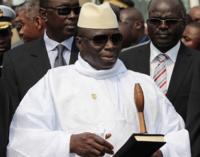Diego Blanco
Diego Blanco | |
|---|---|
 Blanco in 2015 (centre) | |
| President of Rotania | |
| Assumed office 19 May 1988 | |
| Prime Minister | Rolando Tafalla Ramon Pareja Eustacio Sánchez Julio Zoido |
| Vice President | Juan Manuel Zorita Tomas Navarro José Velázquez |
| Chairman of the National Security Commission | |
| Assumed office 5 August 1995 | |
| Personal details | |
| Born | Diego Adolfo Blanco Oyibo April 20, 1946 Dukpene, Tieradan West Tusola |
Diego Adolfo Blanco Oyibo (Tieradan pronunciation: [ˈdje.ɣo a.ˈðol.fo ˈβlãŋ.ko o.ˈʝi.βo ]; born 20 April 1946), commonly known as just Diego Blanco, is a Rotanian politician who has been the President of Rotania since 1988. He came to power in a military coup amid the Rotanian Civil War. Since the end of the civil war in 1990, he has been re-elected as President four times, each time drawing accusations of electoral fraud from the international community. He has also been accused of genocide, religious discrimination, and war crimes by various countries and international institutions.
Blanco was born in 1946 in Dukpene, a village in Tieradan West Tusola in what is today Ibase Province. His family were cocoa farmers of the Nsuno ethnic group. Blanco studied for a few years at the Tilakam Mission School in Barané, where he learned Tieradan and Apelian. He became active in the Rotanian independence movement, helping to organize protests against Tieradan colonial authority. When Rotania gained independence in 1968, he joined the Rotanian Republican Army as an officer.
He quickly rose among the ranks of the army, attaining the rank of Teniente General (the second-highest in the army) by 1974. With the breakout of the Rotanian Civil War in 1977, Blanco became a leading figure as the head of the forces loyal to then-President Adisa Abellán. He became further notable for his role in the Madari Massacre, in which his army killed hundreds of civilians in a town held by anti-Abellán forces. In 1988, Blanco orchestrated a coup d'etat against Abellán, taking control of the presidency and prosecuting the war until its finish in 1990 - in which Blanco declared victory.
Since his taking control, Rotania has seen gradual alienation from the international community for its alleged violations of human rights. In 2003, the Union of Patyrian States declared Blanco and "his immediate subordinates" to be persona non grata in its member states due to a "lengthy record of human and political rights violations and unwillingness to cooperate with international authorities." Blanco has regularly suppressed political dissidents and restricted access to elections, the latter of which have been deemed "fake and unfair" by international watchdog groups.
Blanco has lambasted his critics and declared them to be imperialists, while calling for Tusolan self-sufficiency. He is the architect of the Bonaflé Agreement, a pact between various Tusolan states to increase cooperation in trade, infrastructure, and science. Blanco's economic vision has resulted in a wide-scale expansion of natural resource extraction, leading to consistent economic growth as well as environmental degradation.